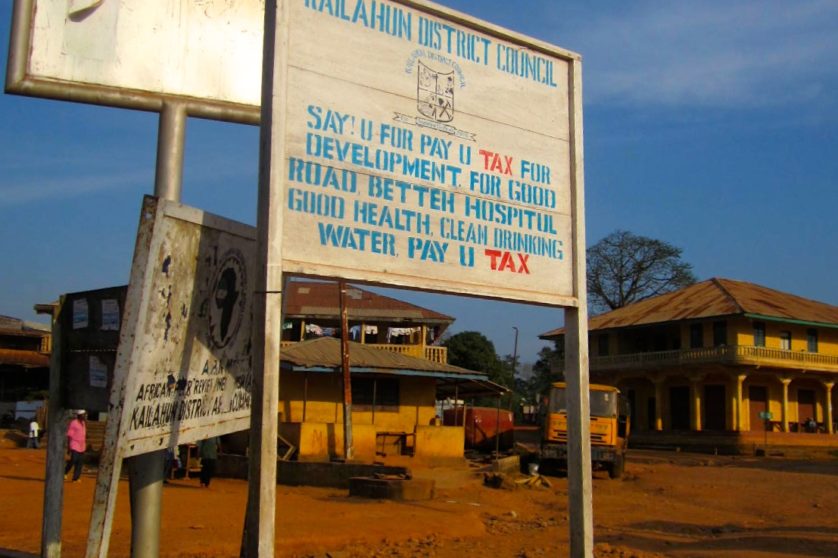Over the past decade, development actors have become much more interested in taxation. This interest has been spurred in large part by a provocative argument: that the process of raising taxes can can stimulate broad improvements in governance. It is argued that the need for governments to tax their citizens can be the leading edge of efforts to strengthen the capacity of governments. Taxation can also provide the basis for a stronger ‘social contract’ between governments and citizens. Governments needing tax revenues have incentives to respond to the needs of citizen-taxpayers, while, in return, taxpayers are able to demand accountability from governments. The ICTD has been at the vanguard in expanding research and discussion of these issues.
The arguments are very important. Supporting higher levels of tax collection is only in the public interest if those taxes contribute to state building, service provision and improved governance. However, the foundations for claims that taxation can stimulate better governance are mainly theoretical and historical. Assertions about their contemporary relevance are often simplified. The ICTD has continuously been keen to translate abstract arguments about taxation and governance into concrete messages for policymakers. This has, in turn, began to have progressive and significant impacts on policy discussions around tax reform.
As a starting point, ICTD research has produced specific policy recommendations for strengthening the connections between taxation and (a) statebuilding and (b) accountability. Each is addressed in turn.
Taxation and Statebuilding
In order to strengthen links between taxation and broader statebuilding, ICTD research indicates that reformers should:
1. Build strong links between tax agencies and related branches in government, in order to maximise the likelihood that improvements in tax collection will ‘spillover’ to other branches of government.
2. Emphasise the importance of collecting reliable, detailed data on tax issues and of sharing data across government: data can be a critical input to broader improvements in the performance of public agencies.
3. Within tax agencies, give priority to organisational reforms that could be replicated elsewhere in government, – like meritocratic hiring, or performance evaluation – to minimise the risk that revenue authorities become isolated ‘islands’ of high capacity within the public service.
4. Focus on strengthening links between central tax administrations and local governments, to extend the benefits of national level reforms throughout government.
A sign board in Sierra Leone
Taxation and Accountability
In order to strengthen links between taxation and accountability, ICTD research indicates that reformers should:
1. Enhance the political prominence of taxation – including via direct taxes: Taxpayers will be better able to demand reciprocity in exchange for taxes when they are clearly aware of the taxes that they pay. This is most likely for direct taxes on income and property, but can be encouraged everywhere through leadership by politicians, civil society and the media.
2. Focus on equity in tax enforcement: Taxpayers are more likely to be able to make effective demands for government services and accountability when they feel they are all in the same boat, and sharing the tax burden equally. When some people – especially the rich – avoid taxes, trust in government and a perception of common citizenship can quickly be undermined.
3. Expand transparency around taxation and budgeting – including, possibly, earmarking specific taxes for particular purposes: Taxpayers will be better able, and more likely, to demand reciprocity from governments when they have information about what revenue is collected, and how it is spent. When trust between governments and taxpayers is low, it may be desirable to earmark some revenues for popular and visible purposes.
4. Directly support inclusive popular engagement, including the creation of inclusive institutional spaces for tax bargaining. This can achieved by supporting parliaments, civil society and business associations, and creating new institutional spaces for engagement.
Transforming Research into Practice
The ICTD has worked to spread those messages to policy makers and international organizations, and thus re-shape the debate about tax reform. Early on, members of the ICTD team focused on drawing attention to the potential links between tax and governance, and figured prominently in important policy discussions, including those leading to the establishment of the African Tax Administration Forum.
The same ideas appeared prominently in a 2011 IMF Board paper on tax reform in developing countries. The ICTD CEO and Research Director Wilson Prichard have presented these ideas in, among others: an address to the Ministerial Meeting of the IMF Fiscal Affairs Department; the recurrent meetings of the OECD Tax and Development Task Force; and several events at the World Bank. US Secretary of State Hilary Clinton drew directly on ICTD work to highlight tax-governance linkages in a 2011 speech to the G20.
With these issues increasingly on the international agenda, the ICTD has shifted to translating them into policy. This began early, with ICTD Research Director Wilson Prichard authoring the seminal OECD report “Citizen State Relations: Improving Governance Through Tax Reform”. It has continued through active engagement with key actors in international organizations. Key recommendations from ICTD work have, in parallel, moved higher on the reform agenda at the IMF and elsewhere, including income and property taxes, greater transparency, equity in enforcement, data sharing and inter-agency cooperation.
